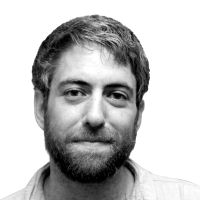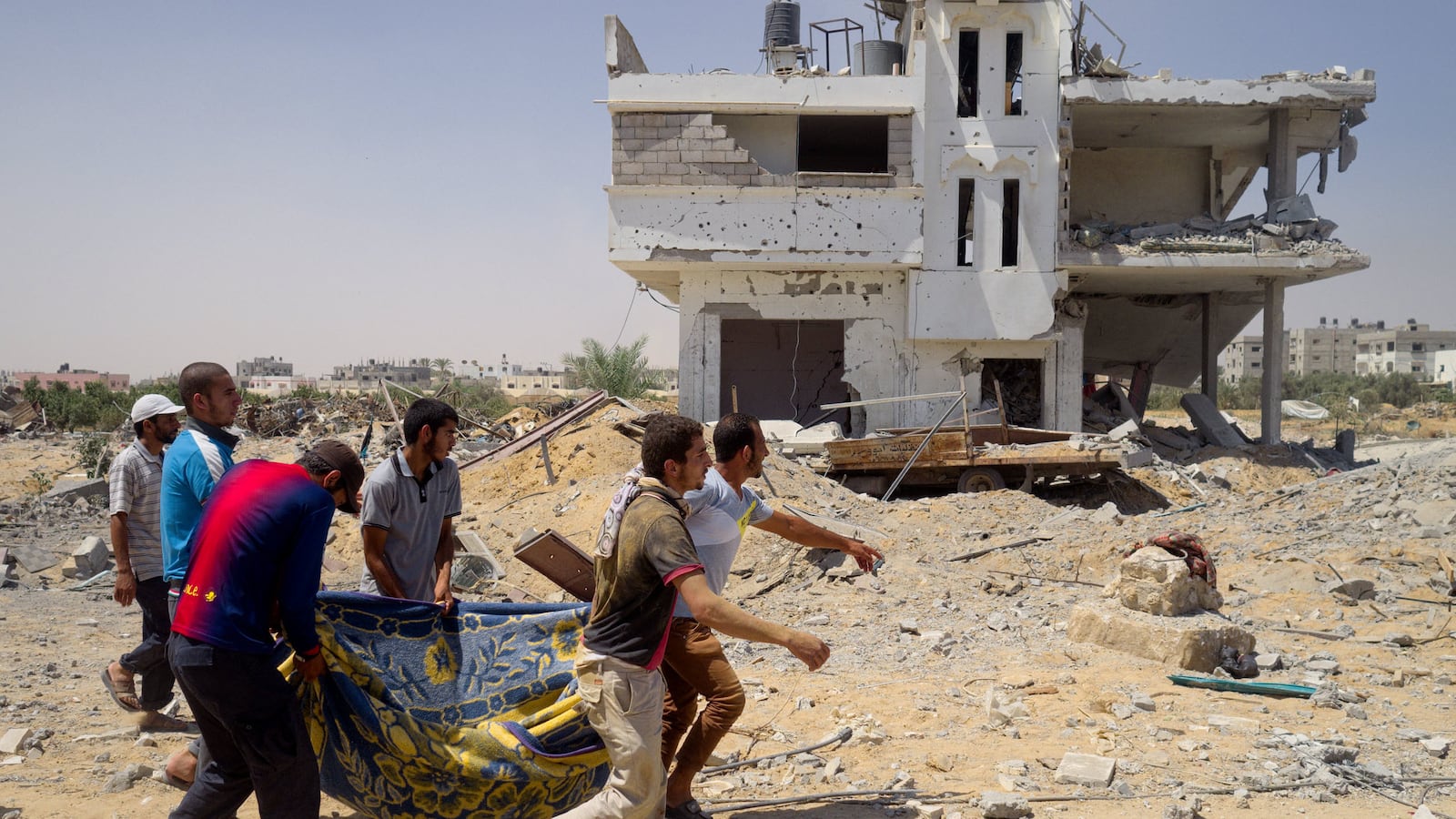KHUZAA, Gaza — In a small bathroom on the edge of the Gaza town of Khuzaa there are the haunting signs of what looks like the summary execution of several Palestinians. This once vibrant village near the border with Israel sits on the edge of the city of Khan Younis, but it is well within the 1.8-mile “buffer zone” that Israel has turned into a no-man’s land. It has been inaccessible for weeks as Israeli bombardment and troops try to take out heavy guerrilla resistance. Now all that’s left is rubble, bombed-out buildings and the all-encompassing, sickening smell of death.
The temporary ceasefire announced Thursday night was supposed to give the residents of places like this time to return home, take stock of the damage and collect belongings. But the “72-hour” ceasefire broke down after 90 minutes, and as I walked through the main street, where pieces of humans were visible beneath homes and stores, the constant thud of exploding Israeli shells grew closer and closer.
As I reach the berm of sand, tile and stucco that marked a kind of front line, bodies are being piled on carts in the street. Near the ruins of a demolished store, the black ammunition vests worn by Palestinian fighters lie in tatters as if hastily stripped off. There are no bodies or weapons nearby.
Suddenly journalists and local residents are shouting from a house on the edge of the front. The small family home is still intact but the stench of rotting flesh that comes from inside is overpowering.
A barefoot corpse in camouflaged khakis is being carried into the street, partially wrapped in rug, as I enter the house. His partly burned and partly decomposing face is unrecognizable as anyone who was ever alive and breathing. Witnesses say there were at least six bodies piled together inside this one tiled room where the air is poisonous with decay.

Blood and blackened remnants are caked on the bathroom floor. The walls have been drenched in blood and they are pocked with scores of bullet holes that look as if they were fired from an automatic weapon at waist level. Some of the bullet holes are in line, as if the gun were sweeping across its targets. There is also soot staining the tiles, suggesting the bodies were burned or there had been a small blast. Several tiles have fallen away from the wall. The house is filled with casings from the bullets used in assault rifles. They are marked on the bottom as “IMI” (Israel Military Industries).
What happened here? It is the kind of place and the kind of incident that may be studied for years. We may hear that the Palestinians were executing suspected collaborators, or that a lone Israeli soldier went mad and started murdering prisoners. It could be that members of an Israeli army unit at the center of the fighting decided to take out their rage on those they captured. There may be many theories. All I can tell you is what I saw and heard at the scene this day.
Twenty-one-year-old Naban Abu Shaar told me he was one of the first to find the bodies. He said they looked as if they were “melted” and piled on top of each other.
“When we entered the bathroom, I found the bodies of people slumped on top of each other in the corner,” he said, staring into the distance as if disconnected from his words.
The owner of the house, Mohammad Abu Al Sharif, said he couldn’t recognize the bodies but believed, because of their clothes, some of the dead may have been from his family. He did not say if any of them were fighters. The house had nine members living in it before Abu Al Sharif, his wife and four daughters escaped Khuzaa 20 days ago. He lost contact with those who stayed, he said.
In the streets around, some residents pulled clothes and blankets from the crushed concrete of obliterated homes while others used farming tools to unearth the dead. Shell-shocked women stumbled down the pulverized road, wiping sweat and tears with their hejabs as they cursed—to no one in particular—both Palestinian Authority President Mahmoud Abbas and Egyptian President Abdel Fattah al Sisi for not protecting them from Israel.
The signs of the panicked flight almost three weeks ago were apparent everywhere in town. Neatly hung laundry still dangled over the main street from the second-floor balcony of an apartment above a blown-out storefront.
Khalid al Najar, 27, was half dazed as he walked back toward Khan Younis with a plastic bag of clothes. This is his first time returning home since he fled nearly three weeks ago. “I’m from a place that used to be called Khuzaa,” he told me.






